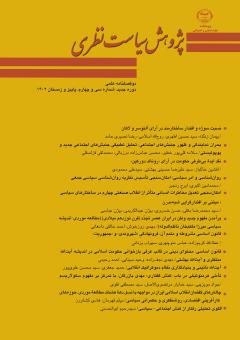نقد ایدۀ بیطرفی حکومت در آرای «رونالد دورکین»
محورهای موضوعی : پژوهش سیاست نظری
افشین خاکباز
1
![]() ,
سید علیرضا حسینی بهشتی
2
,
سید علیرضا حسینی بهشتی
2
![]() ,
سيدعلي محمودي
3
,
سيدعلي محمودي
3
1 - دانشجوی دکتری اندیشه سیاسی، دانشگاه تربیت مدرس، ایران
2 - استادیار گروه علوم سیاسی، دانشگاه تربیت مدرس
3 - استاد گروه علوم سیاسی، دانشکده روابط بین الملل وزارت امور خارجه
کلید واژه: رونالد دورکین, بیطرفی حکومت, خودفرمانی, اصالت, پدرسالاری.,
چکیده مقاله :
یکی از مفاهیم اساسی که اندیشمندانی را که در چارچوب لیبرالیسم سخن میگویند به گروههای مختلف تقسیم میکند، خودفرمانی و حدود و ثغور آن است. از جمله میتوان به تقسیمبندی میان حامیان بیطرفی و کمالگرایی حکومت، یا به عبارت دیگر طرفداران عدم دخالت یا دخالت حکومت در قبال برداشتهای مختلف از زندگی نیک اشاره کرد که اندیشمندان لیبرال را از نظر حد و مرزی که برای آن قائلند، در دو اردوگاه متفاوت جای میدهد. «دورکین»، نظریۀ برابری خود را بر دو اصل دغدغه و احترام برابر و مسئولیت ویژه مبتنی ساخته و بیطرفی حکومت و خودفرمانی را از این دو اصل استخراج میکند. او نیز همچون بسیاری از اندیشمندان حامی بیطرفی حکومت، برای خودفرمانی نقش مهمی قائل است؛ ولی به خودفرمانی تمامعیار قائل نیست و برای آن حد و مرزی قائل است. او به تمایز میان خودفرمانی و اصالت قائل است و برای خودفرمانی، دایرهای محدودتر از اصالت در نظر میگیرد. دورکین ضمن مخالفت با اتخاذ سیاستهای پدرسالارانه از طرف حکومت، دخالت حکومت در حوزههای مختلف حیات سیاسی و اجتماعی را یکسره نفی نمیکند و چنین دخالتهایی را تاحدی ضروری و اجتنابناپذیر میداند. مقالۀ حاضر با بهرهگیری از روش توصیفی- تحلیلی به بررسی انتقادی مفهوم خودفرمانی و جایگاه آن در منظومۀ فکری دورکین میپردازد و میکوشد به این پرسش پاسخ دهد که خودفرمانی و به تبع آن بیطرفی در اندیشۀ دورکین، چه جایگاهی دارد. در نهایت این مقاله نتیجه میگیرد که هرچند محدودیت خودفرمانی در آرای وی، بهویژه در رابطه با برابری در منابع، بیش از چیزی است که اذعان میکند و نگاه پدرسالارانه در بخشهایی از نظریۀ برابری منابع وی به چشم میخورد.
Critique of the Idea of Government Neutrality
in the Views of Ronald Dworkin
Afshin Khakbaz*
Seyyed Alireza Hosseini Beheshti **
Seyyed Ali Mahmoudi***
One of the fundamental concepts that categorizes intellectuals who speak within the framework of liberalism into various groups is autonomy itself and its limits and boundaries. Among these categories, one can refer to the division between supporters of government neutrality and perfectionism, or in other words advocates of non-intervention or government intervention in relation to different aspects of life, which place liberal thinkers in two distinct camps in terms of the limits and boundaries they advocate for. Dworkin constructs his theory of equality based on two principles of concern and equal respect and unique responsibility and extracts government neutrality and autonomy from these two principles. Like many advocates of government neutrality, he attaches importance to autonomy; however, he does not endorse absolute autonomy and advocates for limits and boundaries. He distinguishes between autonomy and authenticity, considering autonomy to have a narrower scope than authenticity. Dworkin, while opposing the adoption of paternalistic policies by the government, does not outright negate government intervention in various areas of political and social life, deeming such interventions to some extent necessary and unavoidable. This article, utilizing a descriptive-analytical approach, critically examines the concept of autonomy and its position in Dworkin's intellectual framework and seeks to answer the question of what place autonomy and consequently neutrality hold in Dworkin's thought. Ultimately, this article concludes that although the restriction of autonomy in his views, especially regarding equality in resources, is more than he admits, a paternalistic viewpoint stands out in certain aspects of his theory of resource equality.
Keywords: Ronald Dworkin, State neutrality, Autonomy, Authenticity, Paternalism.
* Corresponding Author: Ph.D Student of Political Thought, Tarbiat Modares University, Iran.
afshinkhakbaz2012@gmail.com
** Assistant Professor, Political Science Department, Tarbiat Modares University, Iran.
abeheshti2002@yahoo.com
*** Professor, Department of Political Science, Faculty of International Relations, Ministry of Foreign Affairs, Iran.
mahmoudi3000@gmail.com
Ackerman, Bruce (1980) Social justice in the Liberal State.
Dworkin, Ronald (1985) Amatter of Principle. Cambridge, Massachusetts, and London: Harvard University Press.
--------------------- (1990) Foundations of liberal Equality (Vol. XI). (G. B.Peterson, Ed.) Salt Lake City: University of Utah Press.
--------------------- (1993) Life`s Dominion: An Argument about Abortion, Euthanasia, and Individual Freedon. New York: Alfred a.Knopf.
--------------------- (2002) Sovereign Virtue: The Theory and Practice of Equality (Fourth Edition ed.). Harvard University Press.
--------------------- (2011) Justice for Hedgehugs. Balknap Press of Harvard University Press.
Goodin Robert E. & Reeve, Andrew (eds) (1989) Liberal Neutrality, Routlege, London and New York.
Hurka, Thomas (1996) Perfectionism. Oxford, New York: Oxford University Press.
Jones, Peter (1989) Liberal Neutrality. (R. E. Goodin, Ed.) New York: Routlege.
Koppelman, Andrew (2014, January) Ronald Dworkin, Religion, and Neutrality. Boston University Law Review, 94, 1241-1253.
Larmore, Charles (1996) Patterns of Moral Complexity. Cambridge University Press.
Nagel, Thomas (1991) Equality and Partiality. Oxford: Oxford University Press.
Nozik, Robert (1999) Anarchy, State and Utopia. Blackwell Publishers.
Quong, Jonathan (2011) Liberalism Without Perfection. Oxford: Oxford University Press.
Raz, Joseph (1994) Ethics in the Public Domain: Essays in Morality of Law and Politics. Oxford: Clarendon Press.
Ripstein, Arthur (2007) Ronald Dworkin. Cambridge University Press.
Shiffrin, Seana Valentine (2004) Dworkin and His Critics. (J. Burley, Ed.) Blackwell Publishing.
Wall, Steven (1998) Liberalism, Perfectionism and Restraint. Cambridge University Press.


